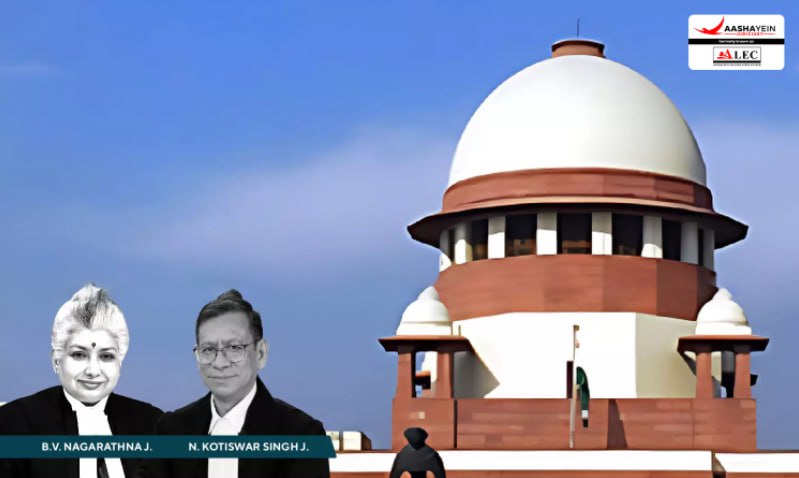Section 498A has traditionally been regarded as a crucial provision for the protection of women. However, in recent times, the section has undergone a shift, and instead of safeguarding women, it has been misused to harass men. This change has become increasingly apparent, especially in light of recent events, such as the tragic suicide of Bengaluru techie Atul Subhash, which has sparked nationwide discussions on the matter. Amid this ongoing debate, the Supreme Court has voiced its concern, emphasizing that the original intent of the provision to protect women is now being exploited to target husbands and in-laws for personal vengeance.
Supreme Court’s observation
Hon’ble Supreme Court in a recent case of “Dara Lakshmi Narayana and Others vs State of Telangana and Another” the court was dealing with the case of quashing the FIR under section 498A of IPC. The wife filed the FIR after the husband applied for dissolution of marriage by mutual consent. The division bench of “Justices BV Nagarathna” and “N Kotiswar Singh” quashed the FIR and noted that this section is getting misused now for settling scores. It held that “The inclusion of Section 498A of the IPC by way of an amendment was intended to curb cruelty inflicted on a woman by her husband and his family, ensuring swift intervention by the State. However, in recent years, as there has been a notable rise in matrimonial disputes across the country, accompanied by growing discord and tension within the institution of marriage, consequently, there has been a growing tendency to misuse provisions like Section 498A of the IPC as a tool for unleashing personal vendetta against the husband and his family by a wife.”
The Court made a balance between the misuse of law and the need for law. The bench on the one hand noted that wives invoke this section in common matrimonial disputes as well which goes against the purpose of this section. It said that if these acts are taken to Court in the name of cruelty, then this would lead to giving power to wives to arm-twist their husbands in mere inconvenience. However, the bench on the other hand noted that we are not making a generalized comment that women who suffer from cruelty should remain silent and not act on it. Although we do not intend to deny justice to legitimate instances, we do not support situations such as this one, in which the husband files a complaint under Section 498A of the IPC in response to his petition for the dissolution of the marriage.
You can also read the latest judgment by visiting [Latest Judgment].
For more information, visit [Aashayein Enquiry Section]
Bengaluru techie suicide case
The tragic suicide case of Bengaluru techie Atul Subhash has raised widespread concern across the country. Atul Subhash, an AI developer, was found dead at his home, leaving behind an 80-minute video and a 24-page statement detailing the emotional abuse and harassment allegedly inflicted by his wife and her family. He claimed that the legal cases against him were the primary source of his distress. In his message, Subhash, who got married in 2019 and had a son in 2020 spoke about his struggles with mental health. This incident has once again sparked discussions about the misuse of anti-dowry and domestic violence laws, particularly Section 85 of the Bhartiya Nyaya Sanhita (BNS), formerly Section 498A of the IPC.
What is section 498A of IPC?
When the incidence of cruelty over wives in marriage increased the Central Government felt the need to introduce a law that could deal with it. The Government of India introduced “Section 498A” into the Indian Penal Code (IPC) through the “Criminal Law (Second Amendment) Act, 1983”, under “Chapter XX-A”, addressing cruelty by a husband or his relatives. This amendment was aimed at protecting women’s rights and empowering them. Section 498A punishes acts of cruelty intended to extort property from women.
The term “cruelty” is broadly defined under Section 498 A of IPC as “Whoever, being the husband or the relative of the husband of a woman, subjects such woman to cruelty shall be punished with imprisonment for a term which may extend to three years and shall also be liable to fine.”
How it can be misused
The misuse of Section 498A IPC has been a contentious issue in India for years. It is often alleged that false or exaggerated complaints are filed to settle personal disputes, gain an advantage in divorce cases, or extort money. In the landmark case of Arnesh Kumar v. State of Bihar (2014), the Supreme Court of India highlighted the frequent misuse of this provision, noting that innocent family members were often implicated without substantial evidence. The Court stressed the importance of thorough police investigations before arrests to prevent undue harassment of the accused.

